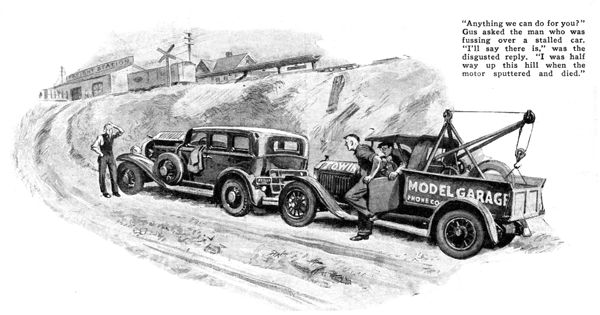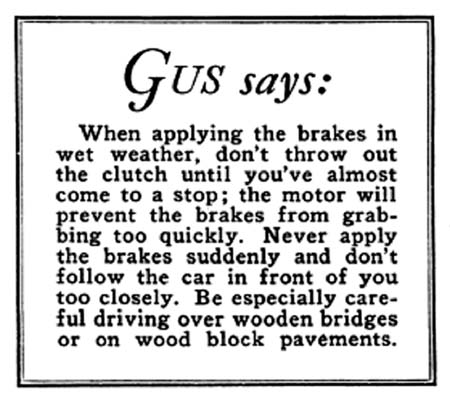November 1932
Gus tells -
HOW TO INSPECT A STALLED MOTOR
by Martin Bunn

Gus Wilson slid into the driver's seat of the wrecking car, touched the starter ignition, and was about to drive out of the Model Garage when Joe Clark, his partner, arrived for the day's work.
"Ride over to the freight station with me, "Gus called in answer to Joe's greeting. "I've got to pick up a load of tires and I'll need some help. The kid will look after the place till we get back."
Near the station the wrecker rounded a blind curve. Gus turned his head in response to a sudden nudge from Joe's elbow.
"Look," directed Joe, pointing to a small man standing beside the opened hood of a car parked half way up the steep hill directly ahead of them. "Somebody's got into trouble bright and early this morning. Scratching his head about it, too. Guess he doesn't know much about motors."
Gus took his foot off the gas and brought the wrecker to a stop a few feet behind the parked car.
"Anything we can do for you?" he inquired.
"I'll say there is," came the disgusted reply. "I was half way up this confounded hill when my fool motor began coughing and screeching and finally sputtered and died. And I'll be hanged if I can find out what's wrong.
"Out of gas?" Gus asked as he stepped on the starter and pulled the choke all the way out.
"Nope, I thought of that, but the tank's almost two-thirds full."
"There's plenty of gas and the gasoline line isn't clogged up either from the looks of this," Gus said, pointing to a steady trickle coming from the carburetor he had flooded by turning the motor over with choke out.
"Generally there are three things that'll make a motor die is action," Gus stated. "No gas, a clogged gas line, and bum ignition. Since it isn't the first two, your trouble probably is the ignition."
"But I had a new set of wires put in about three months ago," the man protested.
Gus grinned broadly, The wiring's not the only thing that can go wrong with an ignition system. Ever hear of the breaker arm?" He unsnapped the clips on the distributor. "There's one place to look when a motor dies from bad sparking."
Interested, the driver leaned over the fender and peered into the distributor as Gus moved the breaker arm back and forth to illustrate its action.
"You see," Gus explained, "when the distributor shaft turns, the little cam attached to the shaft opens and closes these contacts. Now we'll turn on the ignition and see what happens."
Gus again opened and closed the breaker and this time grinned with satisfaction.
"There's the clue to your troubles," he reported. "The breaker points are so badly chewed up and burned they don't make good contact and they arc badly now and then just as they are opening.
"That means two things, "Gus went on to explain, "First the breaker points need replacing; second, your condenser's probably gone haywire. The burned points are what caused some of your trouble, but ten to one a bum condenser caused the contacts to burn in the first place. Been having any trouble with the motor lately?"
"Come to think of it, I have," admitted the man. "Had trouble starting only this morning, but after several tries I finally got it going and didn't think anything more about it. Maybe the condenser was on the blink then."
"Sounds like it," agreed Gus, selecting a screw driver and some small wrenches from the large tool box that formed a part of the wrecker's running board. "First we'll take out those breaker points and try and redeem them. While we're doing that, Joe'll drive back to the garage and pick up a new condenser."
Gus was busily rubbing the contacts back and forth over a small oilstone when Joe Clark returned with the new part.
"As I was saying," repeated Gus after examining the condenser, "you can touch up these points without even taking them out if you want to. Just hold a small file between them and pull the file back and forth. That'll do the trick if they aren't chewed up too much. I always like to get them out in the open, though, where I can look them over."
With both garage men working, it wasn't many minutes before the points were back in the distributor, adjusted to the right spacing and connected into the new condenser.
Gus laid his tools on the running board and slid into the front seat of the stalled car. A few tries with the starter and the motor ran sweetly.
"By rights," said Gus, "those points ought to last you four or five thousand miles without any attention. If they do go bad before that and your motor begins to act up, you can bet your bottom dollar it's the condenser.
"Finding out what's wrong with a motor that dies suddenly on the road is easy if you'll only remember that two things are needed to run an automobile -- gasoline and electricity. "Try one, then the other, and it's a cinch you'll locate the trouble."
"But, Gus," inquired Joe when the two garage men were again on their way to the railroad station, "that bird's car didn't look more than a year old. How come the condenser burned out so soon?"
"Condensers are funny things," said Gus. "Sometimes they'll last forever and sometimes they'll go on the bum in a couple of weeks. You just can't depend on them. That fellow's condenser was only partly gone, but it was bad enough to burn down the points after a while.
"The tough part of it is, condensers aren't something the average man can fix, so when you're miles from nowhere and haven't a spare one with you, the nearest garage nicks you for the price of a tow. I've carried a spare in every car I've owned. I've never had to use one, but when I do it'll be there -- and worth its weight in gold."
END
L. Osbone 2019
